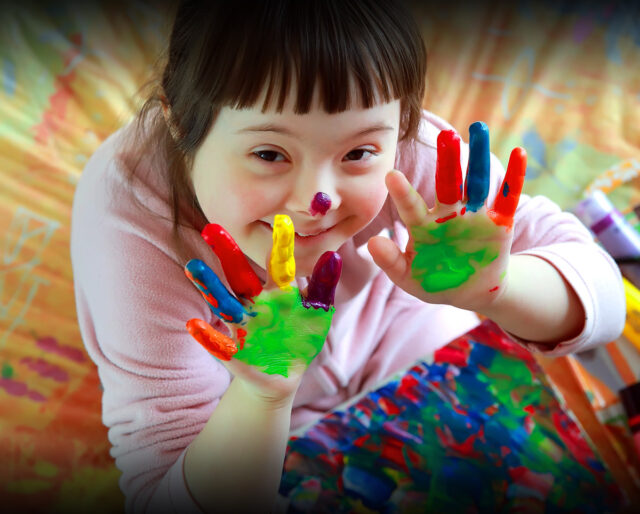March 2, 2023
Creating inclusive communities: March is developmental disabilities awareness month
 Developmental Disabilities Awareness Month is recognized annually in March, through presidential proclamation, as an opportunity to celebrate the inclusion of people with disabilities in civic and social life to create strong and diverse communities.
Developmental Disabilities Awareness Month is recognized annually in March, through presidential proclamation, as an opportunity to celebrate the inclusion of people with disabilities in civic and social life to create strong and diverse communities.
The month also provides the catalyst to raise awareness about the many barriers that people with disabilities still face in achieving both self-determination and full societal inclusion.
Read about the history of developmental disabilities awareness month
The awareness campaign theme for 2023, developed by the National Association of Councils on Developmental Disabilities, is “Beyond the Conversation.” The theme is intended to spark conversation about next steps, beyond raising awareness, for supporting full inclusion of people with developmental disabilities in society.
What are developmental disabilities?
Easterseals, the national nonprofit leader in empowering people with developmental disabilities to be full and equal participants in society, defines developmental disabilities as disabilities that occur from birth to the first few years of development, may impact day-to-day functioning, and are typically lifelong diagnoses.
Common developmental disabilities include autism spectrum disorder, cerebral palsy, down syndrome, hearing or vision loss, learning disorders and ADHD.
Developmental disabilities are understood to be caused by a complex interaction of factors including genetics, parental health and behaviors during pregnancy, or by complications during birth, among other possible factors. The specific cause is often unknown.
The prevalence of developmental disabilities is more common than people realize. According to the Centers for Disease Control and Prevention, 17% of children in the United States between the ages of three and 17 have one or more developmental disabilities or delays.
More than five million Americans reportedly have developmental disabilities.
Living with developmental disabilities can create a variety of challenges, such as difficulties with mobility, communication, self-help, independent living and physical and mental health issues. Moreover, people with developmental disabilities are vulnerable to abuse and neglect on many levels, including physical, psychological, legal, and systemic abuse.
Learn more and get involved
UW’s Do-IT (Disabilities, Opportunities, Internetworking, and Technology) Center is dedicated to empowering people with disabilities through technology and education. It promotes awareness and accessibility—in both the classroom and the workplace—to maximize the potential of individuals with disabilities and make our communities more vibrant, diverse, and inclusive.
Parents and caregivers can use the CDC’s Learn the Signs, Act Early program to monitor children’s development and know when there might be a concern; the brief checklist of milestones provides a child development baseline.
Check out Art Enables, an art gallery and vocational arts program dedicated to creating opportunities for artists with disabilities to make, market, and earn income from their original and compelling artwork. Resident artists receive 70% of all art sales. Purchase artwork by resident artists.
Watch Easterseals’ latest PSA series: Easterseals employs an inclusive cast and crew led by people with disabilities highlighting how Easterseals is expanding local access to healthcare, education, and employment for people with disabilities, families, and communities across the country.
Support
Consider making a one-time contribution or setting up payroll deduction to one of our CFD member organizations working to create a better and more inclusive life for people living with a developmental disability:
The Arc of King County (charity code 0315598): The Arc of King County promotes and protects the rights of people with intellectual and developmental disabilities so they can live, learn, work and play in the community – improving the quality of life for us all.
Easter Seals Washington (charity code 0315936): Changing the way the world defines and views disabilities by making profound, positive differences in people’s lives every day.
Disability Rights Washington (charity code 1481504): Our mission is to advance the dignity, equality, and self-determination of people with disabilities. We pursue justice on matters related to human and legal rights.
Seattle Children’s Hospital and Research Center Foundation (charity code 0496965 ): Our dedicated researchers are working relentlessly to improve treatments for more than 200 diseases and conditions to discover the most effective, least invasive and best options for the kids who need it most.
Summit Assistance Dogs (charity code 0315210) creates life-changing partnerships by providing highly skilled mobility service dogs for people living with disabilities in the Pacific Northwest.
Kindering (charity code 0315445): Kindering embraces children of diverse abilities and their families by providing the finest education and therapies to nurture hope, courage, and the skills to soar.
Atlas Assistance Dogs (charity code 1482419) Atlas provides support to assist people with disabilities in training their own service dog. We also provide online courses to train and certify experienced dog trainers to be service dog trainers.
Wonderland Kinds (charity code 1478424): is a nonprofit agency serving children with developmental delays, disabilities, and prenatal substance exposure. Founded in 1969, Wonderland is dedicated to helping children meet healthy developmental milestones.
Dogs for Better Lives (charity code 1478994) Professionally train dogs to help people and enhance lives while maintaining a lifelong commitment to all dogs rescued or bred and the people served. Our three assistance dog programs are: Hearing, Autism, and Program Assistance.